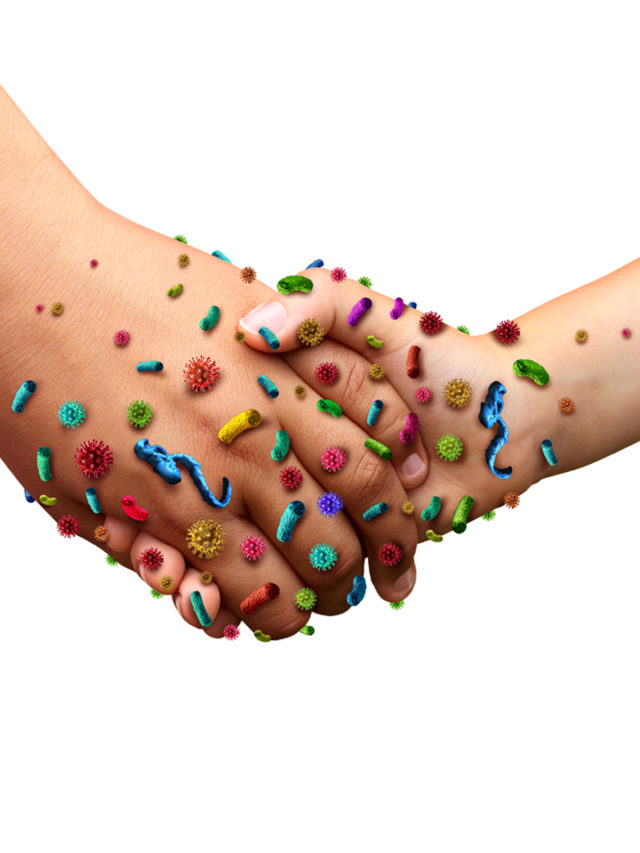Verified By Star Health Doctors
What is Infection?
Infection is the invasion of microorganisms like bacteria, viruses, yeast, fungi, yeast and parasites. These microorganisms can invade the body, spread to other parts, and affect a person’s health.
If an infection invades a person, it can cause fever, and in some cases, it can be fatal depending on the organism that has invaded or infected. The invasion of infection depends on a person’s immune system. If a person has a strong immune system, the body will be able to combat the pathogens.
Humans contain microbes in the body. These microbes play beneficial roles, which help in digestion, breaking down complex nutrients and regulating the immune system. These microbes are called probiotics. But the organism that causes infections is harmful to the human body.
Microbes depend on other organisms for their survival. The organism that a microbe infects and invades is called a host. In some severe infections, the microorganism can even kill the host. Examples include HIV, Tuberculosis, smallpox and COVID-19. They infect the host for years and, in the end, kill the host.

Types of infection
Various types of microorganisms infect the human body. They are bacteria, viruses, fungi and prions.
Bacterial infection
Bacteria are single-celled organisms and not visible to the naked eye. The bacteria exist in three predominant shapes—spherical, rod-like and curved.
Bacteria are almost present in every environment and can exist at various temperatures. These bacteria produce toxins called bacteriocins. These bacteriocins can even survive in high temperatures and cause disease to the host.
The bacteria contain circular DNA called plasmids. These plasmids contain essential genetic material for reproduction and cellular functions.
Once the bacterial cell enters the host, they invade the host immune system and start to multiply. Once they have multiplied, it infects the host and causes disease.
Bacteria are of two types one is the friendly bacteria, and the other causes diseases in humans. The bacterial organism that enters the human body adapts to the environment and starts to reproduce.
Some bacteria produce toxins, and even if the organism dies, the toxins become resistant and cause disease to the host.
The common bacterial infections include tuberculosis, strep throat, urinary tract infection, gonorrhoea, typhoid, diphtheria, cholera and pneumonia.
These bacterial infections can be effectively treated with a course of antibiotics. However, some strains can be resistant to antibiotics.
Viral infection
Virus species like hepatitis and SARS cause viral infections. The virus contains a genetic code and is coated with a lipid that protects the virus. The virus also contains a protein responsible for causing the host’s disease.
The virus can infect any organism, like humans, plants and animals. The virus attaches itself to the host. Most viruses contain RNA and synthesise their DNA with host cells’ help.
Once they enter the host cell, they release their genetic material and manipulate the host cells to produce viral DNA. Once the virus attaches itself to the host, it multiplies and invades the immune system of the host cell.
They start to multiply and produce new viral cells in large numbers. The virus during the multiplication period remains dormant. Once they have fully invaded the host, they become active.
In some cases, the virus do not kill the host. If the host dies, the virus will not be able to survive. So, some virus only infects the host. For example, the human papillomavirus causes the host cells to multiply uncontrollably. The uncontrolled multiplication of cells leads to cancer.
The virus also specifically infects or targets a specific group. Sometimes, young adults and children will be targeted, and in some cases, infants can be infected.
Even if the virus is treated with an antibiotic, it may reactivate after some time, and the infected person may fall ill again.
Some of the common viral infects are
- Encephalitis,
- Meningitis,
- Herpes simplex virus (HSV),
- COVID-19,
- Zika virus,
- Ebola and
- Dengue fever.
Fungal infection
Fungi are usually spore-forming organisms. The structure of the fungus will be long and cylindrical, with a small filament branching from the long stalk. Fungi can be found on household walls, plants, lakes and dirty places.
Most fungi are harmful, and only a few species can be consumed—for example, mushrooms.
Fungi are also singled organisms—for example, yeast. The fungi produce single-cell spores through which the reproduction happens.
Most fungal infections infect the skin and then pass through to deep layers. Inhalation of spores can be harmful and lead to a fungal infection. This type of infection is called a systemic infection.
Most fungi infection causes skin diseases that can lead to irritation, bumps, redness, dry, scaly skin, swelling and blisters.
The common fungal infections are yeast infection, ringworm, athlete’s foot, jock itch and onychomycosis.
Ringworm is a common infection that appears as a circular rash. Jock itch causes infection in the moist and warm areas of the body. It causes redness and rashes accompanied by severe itching. The commonly affected places are the inner thighs and groin.
The athlete’s foot causes a scaly rash on one or both feet. These rashes may burn, sting and itch.
Fungal infections can be treated with over-the-counter (OTC) antifungal creams. If the antifungal creams do not work, oral medication will be required to treat the severe fungal infection.
Prion disease
Prion diseases are a rare form of the disease that affects the brain and can be fatal. Prion diseases are spongiform encephalopathies that are transmitted through infectious agents called prions.
The prions are derived from a misfolded host protein called prion protein. Prion diseases are bovine spongiform encephalopathy (BSE), also called mad-cow disease. It affects the cattle.
Creutzfeldt-Jakob disease (CJD) affects humans, scrapie affects sheep, and the chronic wasting disease affects deer and moose.
Prion disease can spread from animals to humans. Human variants like Creutzfeldt-Jakob disease (CJD) can affect humans and are transmissible to other humans through contaminated blood.
Currently, no treatments are available for prion disease, which turns out to be fatal. There is no definitive diagnosis for the disease.
Do infections spread in different ways?
The infection spreads through different modes. The infection spreads from humans to animals and animals to humans. The infection can spread through the mouth, nose and eyes. The common modes of infection are briefed below.
Skin contact
Most infection happens through skin contact. Many infections can be present on the skin. When there is a wound, the infection may enter through the cut.
Scabies is caused by mites that live in the skin and spread from skin-to-skin contact. Ringworm is a fungal infection that spreads through an infected person or animal.
Some common symptoms of skin contact infections are itching, rash, skin rubs in the infected area, burning sensation, tingling and numbness.
Transfer through bodily fluids
Certain infections can spread through body fluids like sweat, sperms, blood, vaginal fluid and breast milk. For example— if a mother is affected with HIV, the virus might spread to the child through breast milk if the mother did not take any vaccine.
However, the HIV infection can spread to the foetus in the womb if the mother does not take a vaccine for the disease.
When an infected person’s body fluid is passed to a healthy person, they might get affected by the infection.
The infection can also spread through used syringes, while an infected person coughs and the infection spreads through the mucous. The infection can also spread through unprotected sex.
Contact with faeces
When a healthy person comes in contact with the infected person or animal faeces, it can infect the healthy person. It can also be vice-versa. When a person uses a restroom and does not wash hands properly, the pathogens may enter the person’s mouth and cause infection.
Typhoid spreads through faeces. E.Coli also causes infection when ingested. It can cause food poisoning. Hepatitis A and E, cholera and adenovirus spread through such contact.
Ingesting contaminated food or water
Most of the microbes and pathogens are ingested through food and water. Most E. coli infections pass through contaminated water and food. Salmonella breeds in contaminated food and water. The most common way of salmonella infection is through contaminated water.
The common symptoms of consuming contaminated food are vomiting, diarrhoea, increase in temperature and dehydration.
Inhaling airborne particles or droplets
Droplets of mucus usually carry germs and pathogens in them. When someone touches the mucous and then touches their face, the pathogen can infect the person.
The droplets of animals can also carry specific pathogens which can infect humans. Common cold and influenza usually spread through droplets. When an affected person coughs or sneezes, the droplet carries the pathogen and infects others.
Common infections that spread through droplets are the common cold, influenza, fifth disease (erythema infectiosum), mycoplasm, pertussis, plague, strep throat and rubella.
Touching an object that a person carrying the pathogen has also touched
The droplets of the infected pathogen may remain on the surface for up to many hours, and when a person touches it, the infection may spread.
Animal waste also carries infections which can carry the pathogen. When touched, the pathogen can infect humans.
Causes of infection
The causes of infection depend on the organism or the pathogen that infects the person or animal. If a virus infects a person, the symptoms may vary, and bacterial infection symptoms may not be too severe like the virus. However, there are deadly bacterial infections like Clostridium.
The symptoms of the infections are discussed below.
Symptoms of Infection
Fever
Fever is a common symptom of infection. Fever can occur irrespective of the pathogen. Fever is caused due to the body’s reaction to the pathogen that has entered the human body.
Fever is temporary and can cause discomfort. However, the fever can reduce when the infection reduces.
Chills and sweats
Chills and sweats can be caused due to fever. When the temperature increases, a person can experience chills and sweats.
Change in cough
Coughing is a common symptom of infection. And the coughing pattern may change depending on the infection.
Sore throat
A sore throat may be caused due to viral infections like flu. A sore throat can be caused due to various reasons like dry mouth, voice strain and sleeping with the mouth open.
Sore throat due to a viral infection can be cured as the infection settles down, but strep throat might require treatment.
Shortness of breath
Shortness of breath can be caused due to respiratory tract infection. When the lungs are filled with fluid, breathing might be difficult. This causes shortness of breath.
Nasal congestion
Nasal congestion or stuffy nose will be caused due to severe infection. The blood vessels in the nose swell due to excess fluid build-up, which causes nasal congestion.
Stiff neck
A stiff neck can be caused due to infection that can invade the tissue, which causes a stiff neck.
Burning or pain during urination
Burning or pain during urination can be caused due to sexual infections like gonorrhoea. This is a common symptom of sexual infection and can occur in both men and women.
Treatments for infection
The treatment for infection depends on the type of pathogen that has caused the infection. If it is a viral infection, a strong antibiotic is required, and a course of antibiotics may be necessary for a bacterial infection.
Some bacterial infections do not require any treatment. They may go away on their own. Fungal infection might require antifungal creams.
Bacterial infections can be treated with antibiotics.
Antibiotics are required to treat bacterial infections. Antibiotics can be used for viral infection and seasonal flu. Some antibiotics can be used to prevent bacterial infections.
There are mechanisms followed by the human body to clear out infections. But some medication may be required to help the immune system eradicate the infection.
Sometimes, a pathogen may become resistant to certain antibiotics. It is essential to take medications at the correct time to avoid such resistant strains. So always take the medication with the advice of a doctor.
The antibiotics course given by the doctor should be completed. The medication can also be taken till the symptoms settle and you feel better.
Seasonal flu and common cold would not require a strong antibiotic. They may be cured with home remedies. However, you might need a strong antibiotic if the cold is bad.
Fungal infections can be treated with antifungal medications.
Most fungal infections can be treated with over-the-counter antifungal medications. Some of the common antifungal medications are clotrimazole, miconazole, fluconazole and amphotericin.
Most medications are for topical applications. Some infections might require oral treatment and topical application.
Preventions of infection
Some infections cannot be prevented due to certain factors, but most infections can be prevented. Certain steps and preventive measures should be followed to avoid infections.
Don’t share personal items.
Personal items like toothbrushes, razors, nail clippers and handkerchiefs should not be shared. These are the point of contact where the infection can spread easily.
Cover your mouth when you cough or sneeze
Most infection spreads when a person coughs or sneezes and the droplet reaches a long distance. Sometimes, the pathogen can settle on the surface, and when a person touches it, they can be infected.
So always cover your mouth when you sneeze or cough. It is also a basic manner for everyone to practise.
Get vaccinated
Vaccinations are essential to reduce the severity of the infection and also to eradicate the infection. When a person is vaccinated, the immune system holds the memory of the infection.
So, when the same infection infects the body, the memory cells help to combat the infection and protect the body from getting infected.
Practice safe sex
Sexually transmitted diseases can be prevented effectively by using precautionary steps. This can protect your partner from getting infected. Sex with a different person can easily spread infection.
Don’t pick your nose.
The nose is the medium for breeding many infections. Most microbes breed when there is a moist and warm environment. So, when you keep your hands on your face, the pathogen can easily enter through the nose.
Exercise caution with animals
Animals can pass the pathogen easily to humans. Animal skin harbours many microbes that are pathogenic to the human body. So always be cautious while handling animals.
Risk Factors of Infections
Poor Nutrition
Nutrition plays an essential role in a person’s health. When a person has poor nutrition, the pathogen can easily infect or invade the person. So always consume nutritious food to avoid any infection.
Lack of Sleep
Sleep helps the body and mind to rest. When a person is deprived of sleep, it might weaken their immune system and lead the way to infection.
Stress
Stress also plays a vital role in a person’s immune system. When a person experiences too much stress, the immune system may be suppressed, and they start to malfunction.
When to see a doctor?
Consult a doctor when you have symptoms like
- Fever, cold and nasal congestion.
- When there is an abnormal rash.
- Pain during urination and other severe symptoms.
Conclusion
Infections are caused by pathogens that are harmful to humans and affect the quality of life. The common symptoms of an infection are fever, body pain, nasal congestion and tiredness. Infections can be treated with over-the-counter drugs, and some might require proper treatment.

It is advised to consult your doctor when the symptoms are severe and to avoid the spread of infection to others. Cover your nose and mouth while you cough to prevent the spread. Take proper medication to heal from the infection.
FAQ:
How do we prevent infections?
Certain things can be carried out to avoid infection.
· Wash your hands frequently with soap and water,
· Get vaccinated and
· Practice safe sex.
What is an infection, and how will it be confirmed?
Infection is when a pathogen invades a person and infects them. The pathogen causes fever and nasal congestion and affects the quality of life. When a person is infected, it can be confirmed by certain diagnostic methods like blood tests and CT scans.
What are breakthrough infections?
A breakthrough infection is when the pathogen or microbe infects everyone, becoming a pandemic and endemic. For a breakthrough infection, there will be no vaccine or specific medication — For example, coronavirus and monkeypox.
DISCLAIMER: THIS BLOG/WEBSITE DOES NOT PROVIDE MEDICAL ADVICE
The Information including but not limited to text, graphics, images and other material contained on this blog are intended for education and awareness only. No material on this blog is intended to be a substitute for professional medical help including diagnosis or treatment. It is always advisable to consult medical professional before relying on the content. Neither the Author nor Star Health and Allied Insurance Co. Ltd accepts any responsibility for any potential risk to any visitor/reader.






